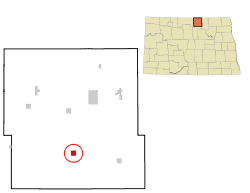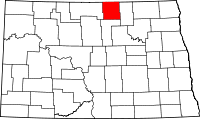Rolette, North Dakota
| Rolette, North Dakota | |
|---|---|
| City | |
 Location of Rolette, North Dakota | |
| Coordinates: 48°39′48″N 99°50′39″W / 48.66333°N 99.84417°WCoordinates: 48°39′48″N 99°50′39″W / 48.66333°N 99.84417°W | |
| Country | United States |
| State | North Dakota |
| County | Rolette |
| Area[1] | |
| • Total | 1.00 sq mi (2.59 km2) |
| • Land | 1.00 sq mi (2.59 km2) |
| • Water | 0 sq mi (0 km2) |
| Elevation | 1,627 ft (496 m) |
| Population (2010)[2] | |
| • Total | 594 |
| • Estimate (2015)[3] | 612 |
| • Density | 594.0/sq mi (229.3/km2) |
| Time zone | Central (CST) (UTC-6) |
| • Summer (DST) | CDT (UTC-5) |
| ZIP code | 58366 |
| Area code(s) | 701 |
| FIPS code | 38-67780 |
| GNIS feature ID | 1030956[4] |
| Website | http://www.rolettend.com/ |
Rolette is a city in Rolette County, North Dakota, United States. The population was 594 at the 2010 census.[5]
History
Rolette was laid out in 1905.[6] The city took its name from Rolette County.[6] Rolette was incorporated in 1930.[6] A post office has been in operation at Rolette since 1905.[7]
Geography
Rolette is located at 48°39′48″N 99°50′39″W / 48.66333°N 99.84417°W (48.663463, -99.844187).[8]
According to the United States Census Bureau, the city has a total area of 1.00 square mile (2.59 km2), all of it land.[1]
Demographics
| Historical population | |||
|---|---|---|---|
| Census | Pop. | %± | |
| 1910 | 408 | — | |
| 1920 | 409 | 0.2% | |
| 1930 | 428 | 4.6% | |
| 1940 | 460 | 7.5% | |
| 1950 | 451 | −2.0% | |
| 1960 | 524 | 16.2% | |
| 1970 | 579 | 10.5% | |
| 1980 | 667 | 15.2% | |
| 1990 | 623 | −6.6% | |
| 2000 | 538 | −13.6% | |
| 2010 | 594 | 10.4% | |
| Est. 2015 | 612 | [9] | 3.0% |
| U.S. Decennial Census[10] 2015 Estimate[3] | |||
2010 census
As of the census[2] of 2010, there were 594 people, 254 households, and 141 families residing in the city. The population density was 594.0 inhabitants per square mile (229.3/km2). There were 284 housing units at an average density of 284.0 per square mile (109.7/km2). The racial makeup of the city was 56.9% White, 0.2% African American, 37.9% Native American, 0.2% from other races, and 4.9% from two or more races. Hispanic or Latino of any race were 1.0% of the population.
There were 254 households of which 29.5% had children under the age of 18 living with them, 35.0% were married couples living together, 15.0% had a female householder with no husband present, 5.5% had a male householder with no wife present, and 44.5% were non-families. 39.0% of all households were made up of individuals and 16.5% had someone living alone who was 65 years of age or older. The average household size was 2.19 and the average family size was 2.92.
The median age in the city was 43 years. 24.1% of residents were under the age of 18; 7.9% were between the ages of 18 and 24; 19.4% were from 25 to 44; 25.1% were from 45 to 64; and 23.6% were 65 years of age or older. The gender makeup of the city was 48.1% male and 51.9% female.
2000 census
As of the census of 2000, there were 538 people, 243 households, and 140 families residing in the city. The population density was 535.4 people per square mile (207.7/km²). There were 286 housing units at an average density of 284.6 per square mile (110.4/km²). The racial makeup of the city was 75.46% White, 21.00% Native American, and 3.53% from two or more races.
There were 243 households out of which 26.7% had children under the age of 18 living with them, 42.4% were married couples living together, 11.9% had a female householder with no husband present, and 42.0% were non-families. 40.7% of all households were made up of individuals and 18.1% had someone living alone who was 65 years of age or older. The average household size was 2.02 and the average family size was 2.70.
In the city the population was spread out with 20.6% under the age of 18, 6.9% from 18 to 24, 20.8% from 25 to 44, 22.7% from 45 to 64, and 29.0% who were 65 years of age or older. The median age was 46 years. For every 100 females there were 94.2 males. For every 100 females age 18 and over, there were 85.7 males.
The median income for a household in the city was $27,500, and the median income for a family was $36,563. Males had a median income of $28,750 versus $21,827 for females. The per capita income for the city was $15,742. About 12.8% of families and 16.8% of the population were below the poverty line, including 27.9% of those under age 18 and 7.3% of those age 65 or over.
Notable people
- Randy Kelly, Minnesota legislator and mayor of Saint Paul, Minnesota
- William C. Marcil, chief executive officer of Forum Communications
References
- 1 2 "US Gazetteer files 2010". United States Census Bureau. Retrieved 2012-06-14.
- 1 2 "American FactFinder". United States Census Bureau. Retrieved 2012-06-14.
- 1 2 "Population Estimates". United States Census Bureau. Retrieved June 29, 2016.
- ↑ "US Board on Geographic Names". United States Geological Survey. 2007-10-25. Retrieved 2008-01-31.
- ↑ "2010 Census Redistricting Data (Public Law 94-171) Summary File". American FactFinder. United States Census Bureau. Retrieved 2 May 2011.
- 1 2 3 "Explain Origin of All County Towns". Turtle Mountain Star. September 5, 1940. p. 7. Retrieved 2 May 2015.
- ↑ "Rolette County". Jim Forte Postal History. Retrieved 14 February 2015.
- ↑ "US Gazetteer files: 2010, 2000, and 1990". United States Census Bureau. 2011-02-12. Retrieved 2011-04-23.
- ↑ "Annual Estimates of the Resident Population for Incorporated Places: April 1, 2010 to July 1, 2015". Retrieved July 2, 2016.
- ↑ United States Census Bureau. "Census of Population and Housing". Retrieved January 19, 2014.
